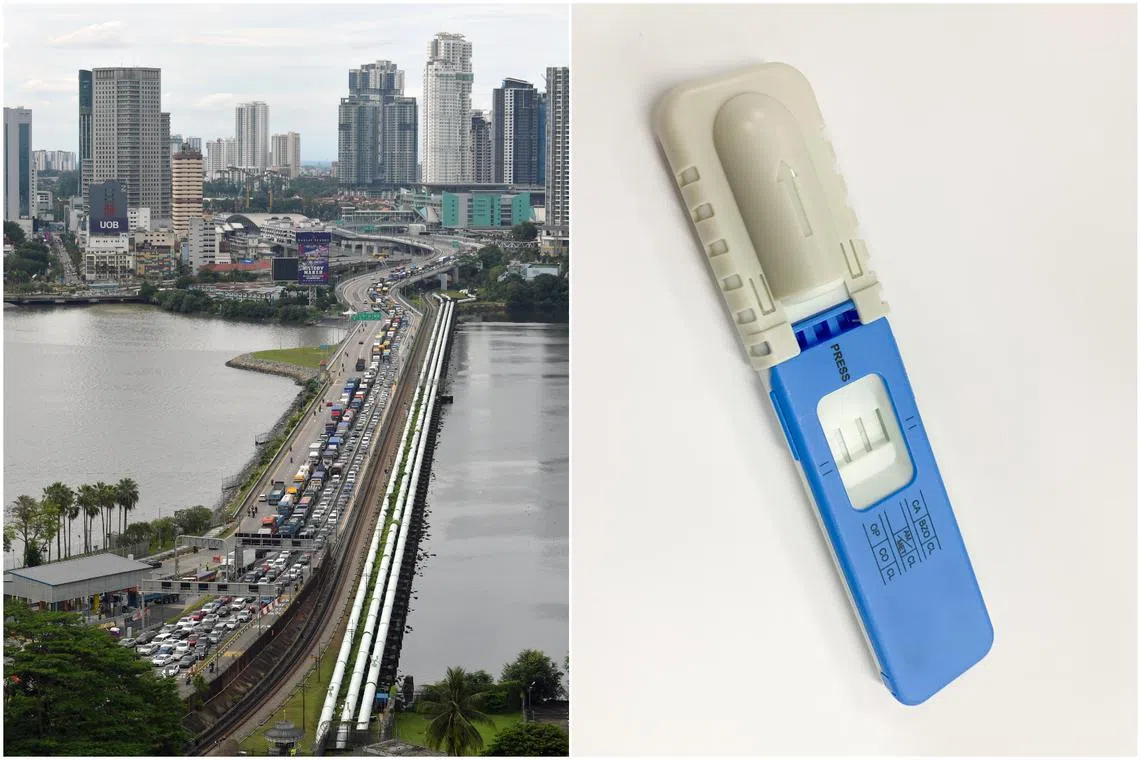New saliva test kit for drugs used at Singapore checkpoints and roadblocks
Sign up now: Get ST's newsletters delivered to your inbox

The kit is an on-site preliminary screening tool that will aid officers in their assessment of potential drug abuse.
PHOTOS: ALPHONSUS CHERN, CENTRAL NARCOTICS BUREAU
SINGAPORE - A new saliva test kit for drugs that can produce results in about 10 minutes has been deployed at checkpoints and roadblocks.
In the debate on the budget of the Ministry of Home Affairs (MHA) in Parliament on Monday, Minister of State for Home Affairs Muhammad Faishal Ibrahim said the kits have been used at checkpoints since January to deter Singaporeans and permanent residents from abusing drugs overseas.
He added that drug use continues to rise globally, posing challenges to keeping Singapore drug-free. “These kits... are light and compact. They offer a more efficient way to detect drug abusers at the checkpoints,” he said.
A Central Narcotics Bureau (CNB) spokesman told The Straits Times that it also started deploying the kits at police roadblock operations in February.
MHA said the kit is an on-site preliminary screening tool that – with its short turnaround time – will aid officers in their assessment of potential drug abuse.
According to the CNB spokesman, saliva testing improves the bureau’s drug detection efficiency and those who test positive will be arrested and subjected to further tests such as the urine test.
Added the spokesman: “Previously, we would have to escort all suspected drug abusers to the CNB office, where the urine test would be conducted.
“This process takes significantly longer and requires more resources as it involves transporting the suspects to another location and the procurement of urine specimens, and some of the suspects might eventually test negative.”
In response to a question from Mr Gan Thiam Poh (Ang Mo Kio GRC), Dr Faishal said the new saliva test kits are similar to those used for Covid-19, and will have red lines when specific drugs are detected.
He said that while the drug situation remains under control, MHA is concerned about drug abuse among young people. In its annual statistics released in February, CNB said almost two in three of combined repeat and new users of drugs were below the age of 30.
Dr Faishal said most young people agree that drugs are harmful, and support a tough stance against them, but some younger Singaporeans take a more permissive attitude, especially towards cannabis.
He added that there will be more support for inmates, former offenders and their families to reduce long-term recidivism.
Earlier in February, the Singapore Prison Service had revealed the country’s five-year recidivism rate
Dr Faishal said Yellow Ribbon Singapore will be launching a new initiative for releasing inmates to develop new career options in emerging sectors that could include the digital, built environment and agri-tech fields.
He said that through the YR Sandbox initiative, Yellow Ribbon Singapore will work with industry partners to hire such inmates and provide on-the-job training or work-study programmes.
Dr Faishal added that the Singapore Prison Service (SPS) has piloted a new scheme for volunteers to assist in the case management of selected supervisees in community-based programmes. Volunteer case officers will guide the supervisees during and after the programmes.
He said the SPS was also working with community partners to launch the new Desistor Network in April. Desistors are former offenders who have stayed clear of crime and drugs and will serve as mentors to recently released former offenders.
Said Prof Faishal: “This will also strengthen the desistors’ sense of self as contributing members of the community.”



